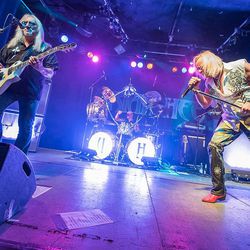 Judas Priest
Judas Priest
 Uriah Heep
Uriah Heep


Las Vegas, Nevada, United States
Uriah Heep’s history begins in 1969, when the pop-rock and R&B band “Spice” from London changed its name to Uriah Heep (from a character in Charles Dicken’s novel). The group consisted of David Byron (vocals-born as David Garrick), Mick Box (lead guitar), Paul Newton (bass) and Alex Napier (drums). Ken Hensley (keyboards e.t.c.) became the new member in early 1970 and the group started to use its new name, while the changed their sound to a more hard rock and progressive rock style (with sometimes heavy metal elements).
The group’s first album was “...Very 'Eavy ...Very 'Umble” that came out in the summer of 1970 and included the participation of two more drummers, apart from Napier who left Heep later. The second album, named “Salisbury”, although it didn’t enter the charts in the UK, included two of the most famous Heep’s songs, “Bird of Prey” and the very popular ballad “Lady in Black”. From that period, a series of a lot of changes to the group’ line-up began, especially in the drums and bass position. Heep’s third album “Look at Yourself” in 1971, entered at both UK and USA charts for the first time and contained one of the group’s best song, “July Morning”.
The most successful period for Uriah Heep was between 1972 and 1975, where they released five successful studio albums, including 1972’s “Demons and Wizards” which peaked at their highest position in the USA and 1975’s “Return to Fantasy” that became their most successful album in the UK. Some of Heep’s best songs were recorded during that era, such as “The Wizard”, “Easy Livin’”, their only song entering at the top 40 on the USA charts, “Sweet Lorraine”, “Stealin’”, “Return to Fantasy” and other. After the album “High and Mighty”, Byron was fired in 1976, due to his alcohol problems which causing conflicts with the other members.
During the next years, Heep recorded seven studio albums with various vocalists, until Bernie Shaw’s arrival, who is the group’s lead singer since 1986. Kerslake left the group in 1979 (he returned in 1981 and stayed until 2007), while bassist Trevor Bolder, who died in 2013, was one of the longest musicians among the continuous changes in the group’s formation. Also, Phil Lanzon became the new keyboardist in 1986 and the last two changes of the group’s line-up were drummer Russell Gilbrook in 2007 and bassist Davey Rimmer who joined them in 2013.
From 1989 till nowadays, Uriah Heep have recorded nine studio albums and many live and compilation albums. They have performed live in various countries all over the world, next to bands such as Kiss, Judas Priest, Def Leppard, Rush, Deep Purple and more.
 Judas Priest
Judas Priest
 Uriah Heep
Uriah Heep


 Judas Priest
Judas Priest
 Uriah Heep
Uriah Heep


 Judas Priest
Judas Priest
 Uriah Heep
Uriah Heep


 Judas Priest
Judas Priest
 Uriah Heep
Uriah Heep

